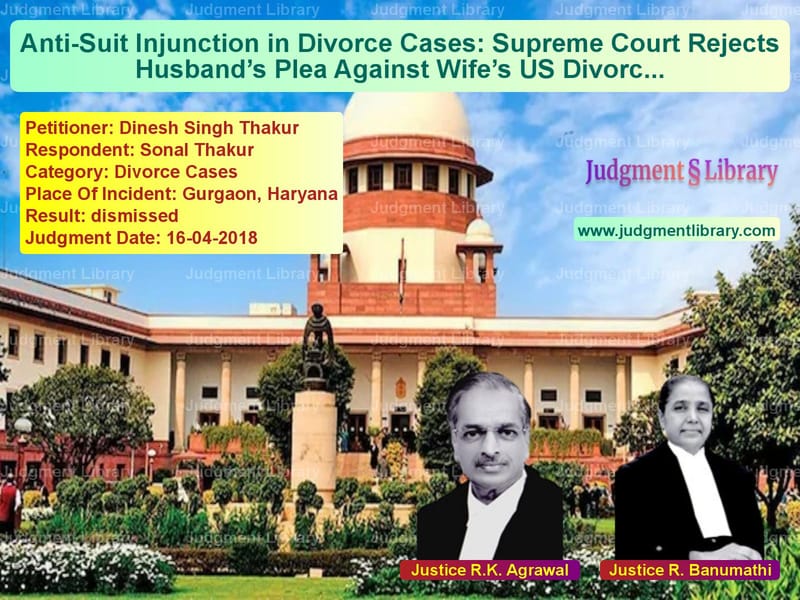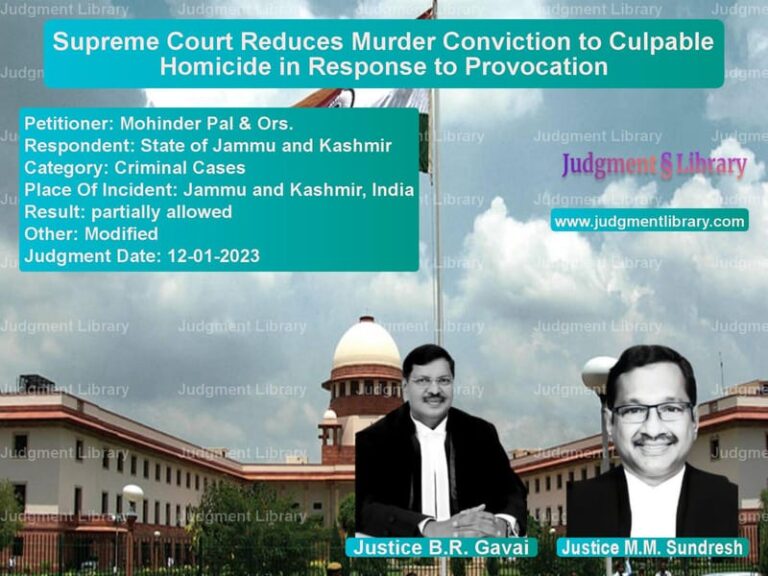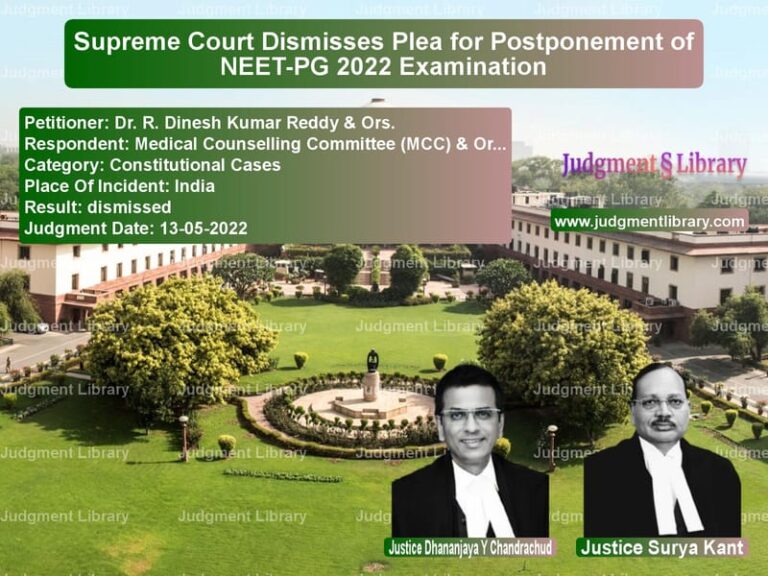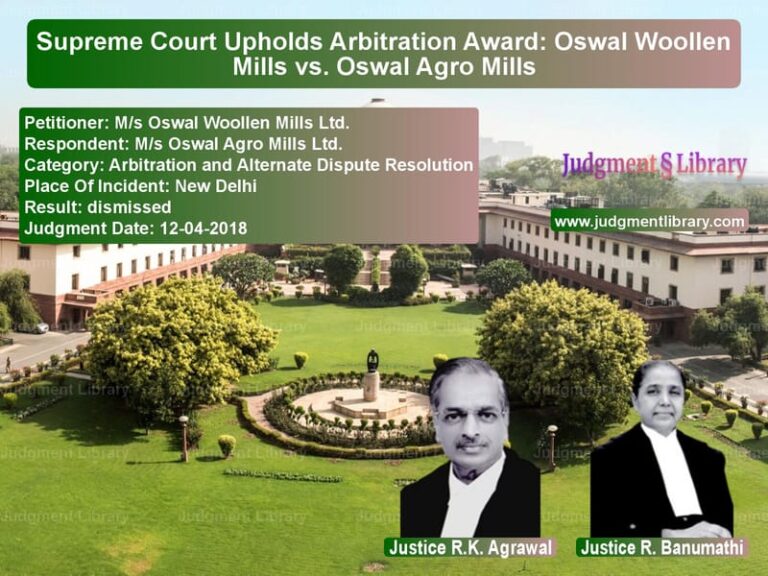Anti-Suit Injunction in Divorce Cases: Supreme Court Rejects Husband’s Plea Against Wife’s US Divorce Petition
The Supreme Court of India recently ruled on an important case concerning the applicability of anti-suit injunctions in matrimonial disputes involving foreign jurisdictions. In Dinesh Singh Thakur v. Sonal Thakur, the Court dismissed the husband’s plea seeking to restrain his wife from pursuing a divorce case in the United States, holding that foreign divorce proceedings were not oppressive or vexatious. The ruling provides clarity on the principles governing anti-suit injunctions in cases of cross-border matrimonial disputes.
Background of the Case
The case stemmed from a dispute between Dinesh Singh Thakur (appellant-husband) and Sonal Thakur (respondent-wife), who were married in India on February 20, 1995, as per Hindu rites. The couple later moved to the United States, obtained US citizenship in 2003, and acquired Overseas Citizens of India (OCI) status in 2006. Their marital discord led to legal proceedings in both India and the US.
Key events in the case:
- The husband filed a divorce petition under the Hindu Marriage Act, 1955 (HMA), at the Family Court, Gurgaon, in 2016.
- The wife subsequently initiated a divorce case in Florida, USA, citing irretrievable breakdown of marriage.
- The husband, seeking to prevent parallel proceedings, filed a civil suit for a permanent injunction in the Family Court, Gurgaon, requesting that the wife be restrained from pursuing her divorce petition in the US.
- The trial court granted an ex parte interim injunction on September 26, 2016, in favor of the husband.
- The wife challenged the injunction, and the District Judge vacated the injunction on October 18, 2016.
- The husband then approached the Punjab and Haryana High Court, which dismissed his revision petition on November 3, 2016.
- The husband filed a special leave petition before the Supreme Court, challenging the High Court’s decision.
Petitioner’s (Husband’s) Arguments
- The husband argued that since his divorce petition was filed first in India, the wife’s subsequent petition in the US should be considered an abuse of legal process.
- He contended that the wife had been residing in India since 2003, making the Family Court in Gurgaon the appropriate jurisdiction.
- He claimed that the wife’s reliance on irretrievable breakdown of marriage as a ground for divorce in the US was not available under Indian law.
- The husband cited Section 41(a) of the Specific Relief Act, 1963, which allows injunctions to prevent a multiplicity of proceedings.
Respondent’s (Wife’s) Arguments
- The wife countered that her US petition was not limited to divorce but also included claims for child custody, alimony, and distribution of marital assets, which were not covered under Indian law.
- She asserted that preventing her from proceeding with the US case would cause her and their children irreparable harm.
- The wife cited various precedents emphasizing that anti-suit injunctions should be granted sparingly and only when foreign proceedings were oppressive or vexatious.
Supreme Court’s Observations
The Supreme Court extensively analyzed Indian and international legal principles on anti-suit injunctions. Key observations included:
- “Anti-suit injunctions should be granted cautiously and only when continuation of the foreign proceedings is vexatious, oppressive, or results in manifest injustice.”
- “The wife has been residing in India, but both parties are US citizens. The fact that the wife initiated proceedings in Florida does not make her petition oppressive.”
- “The foreign court has concurrent jurisdiction, and an Indian court cannot assume that the foreign court will act contrary to justice or fairness.”
- “There is no conclusive evidence that the US court’s jurisdiction was improperly invoked.”
Legal Precedents Considered
- Modi Entertainment Network v. WSG Cricket PTE Ltd. (2003) – Laid down principles for granting anti-suit injunctions, including the need for the foreign proceedings to be oppressive or unjust.
- Y. Narasimha Rao v. Y. Venkata Lakshmi (1991) – Held that foreign divorce decrees are only valid in India if they comply with Indian matrimonial laws.
- Harmeeta Singh v. Rajat Taneja (2003) – The Delhi High Court granted an anti-suit injunction when the husband had initiated proceedings in India first.
Final Judgment
The Supreme Court dismissed the appeal and upheld the Punjab and Haryana High Court’s ruling that the wife was entitled to continue her divorce proceedings in the US. The Court ruled:
“The mere fact that the wife’s petition relies on irretrievable breakdown of marriage, which is not a ground for divorce in India, does not make the foreign proceedings vexatious. The principles of comity and fairness must be upheld.”
Thus, the husband’s plea for an anti-suit injunction was rejected.
Significance of the Judgment
This ruling clarifies several important legal principles:
- Limits on Anti-Suit Injunctions: The judgment confirms that Indian courts will not automatically restrain foreign divorce proceedings.
- Recognition of Foreign Court Jurisdiction: The ruling affirms that foreign courts have concurrent jurisdiction in cases involving overseas citizens.
- Grounds for Oppression in Foreign Divorce Cases: The decision provides clarity on when an anti-suit injunction may be granted.
Conclusion
The Supreme Court’s judgment in this case reinforces the principle that anti-suit injunctions must be granted only in exceptional cases where foreign proceedings are oppressive or unfair. This ruling serves as a guiding precedent for cross-border matrimonial disputes, emphasizing the principles of judicial comity and fairness in resolving international family law matters.
Petitioner Name: Dinesh Singh Thakur.Respondent Name: Sonal Thakur.Judgment By: Justice R.K. Agrawal, Justice R. Banumathi.Place Of Incident: Gurgaon, Haryana.Judgment Date: 16-04-2018.
Don’t miss out on the full details! Download the complete judgment in PDF format below and gain valuable insights instantly!
Download Judgment: Dinesh Singh Thakur vs Sonal Thakur Supreme Court of India Judgment Dated 16-04-2018.pdf
Direct Downlaod Judgment: Direct downlaod this Judgment
See all petitions in Mutual Consent Divorce
See all petitions in Child Custody
See all petitions in Alimony and Maintenance
See all petitions in Judgment by R K Agrawal
See all petitions in Judgment by R. Banumathi
See all petitions in dismissed
See all petitions in supreme court of India judgments April 2018
See all petitions in 2018 judgments
See all posts in Divorce Cases Category
See all allowed petitions in Divorce Cases Category
See all Dismissed petitions in Divorce Cases Category
See all partially allowed petitions in Divorce Cases Category







